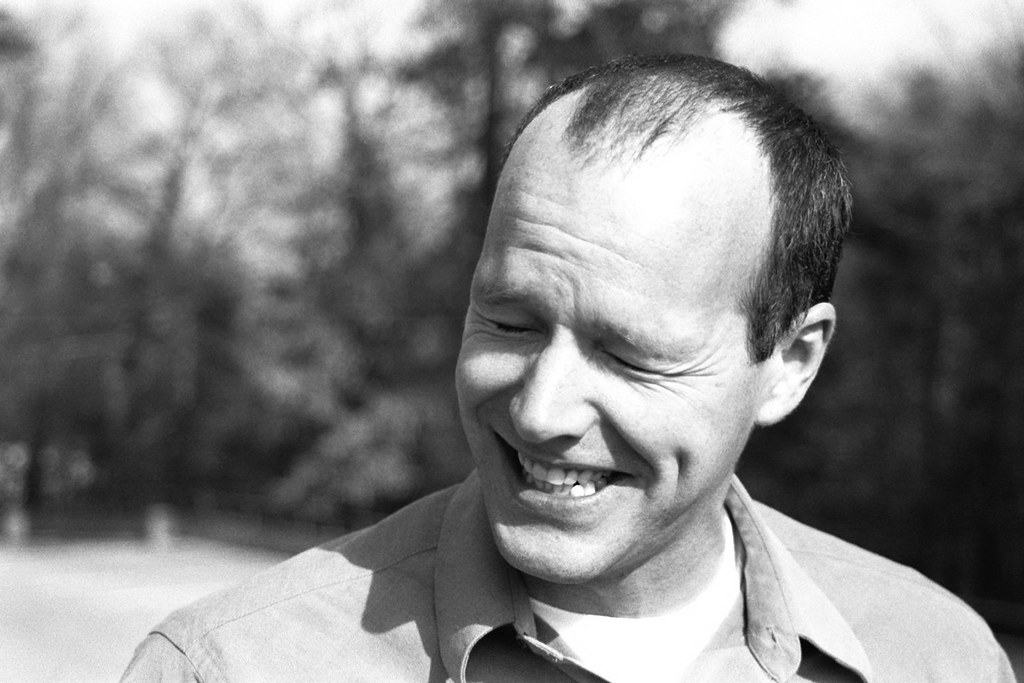Reading Post-Game
Still woefully behind, but I plow on as long as the whiskey is wet....
Brent & Tessa were terrific a little over a week ago now -- Tessa's work has some echos of Michael Palmer in it: lyrical, intelligent, obsessive at times. Brent -- well, see the post below. The main thing I'll say is that Brent does good inter-poem banter. You reader frequenters will know that it is not always a common skill. They were both great -- we had a good crowd, and as always, a great night at the Blue Door. Ted Pope read and shook his hips; Laird Dixon displayed his chess sets, flying pigs, and water buffalo. By the end of the night we were putting our shirts in the freezer and trying to say "Czeslaw Milosz" and "Robert Haas" with our mouths full of crackers.
Thanks to Brent, Tessa, Todd, Laura, Ted, Laird, and everyone who came.
Mr. Tost wrote up a little something something on it here -- thanks, Tony!
At any rate, Chris Vitiello did a great job of introducing Brent, but I don't have the transcripts of it. I will, though, post my intro of Ms. Joseph, and it is below.
Stay tuned and don't forget: John Taggart & Randall Williams! This Satuday, October 22nd! 8pm Internationalist Books!
Brent Cunningham & Tessa Joseph Intro
1. Announcements
a. Blue Door tonight featuring Ted Pope & Laird Dixon
b. October 22nd, Saturday, Desert City with John Taggart & Randall Williams
c. November 12th, Saturday, Desert City with Sarah Manguso & Julian Semilian
2. Welcome
a. Thanks for coming
b. Introduce yourself
c. non-profit, volunteer run organization – please make a donation to support the series and the poets
d. buy books to support the Internationalist
e. sign-up sheet in the back for future information
3. Thank yous
a. Internationalist
b. Brent & Tessa
c. all of you
d. the Mary Duke Biddle Foundation
e. the North Carolina Arts Council
f. the Orange County Arts Commission
4. Tonight, though, we’re here to see Brent Cunningham & Tessa Joseph
5. “The new girl is a story / The new girl is a net full of lobsters // A spilled glass of marbles / A floor slick with oil // Her face is an etching / Her bones dense as fossils // One eye is an angel’s / No color at all” – Tessa Joseph is not the new girl, but she did write the poem, called “Crush,” with these lines: “She will love you until you are sticky. / She will drink all your schnapps. // She will drop you. She will / kiss your eyes.”
6. Joseph may not be the new girl from the poem, but she does know all about lobsters having grown up in Maine – what she has been doing in the middle of North Carolina for so many years now is anyone’s guess. She has, though, found ways to occupy her time, chief among them being her work on a doctorate in English at Carolina, leading the Area Two faculty of the North Carolina Governor’s School, teaching hot (Bikram) yoga to the Triangle’s most flexible, and enthusiastically engaging with the local poetry community.
7. Joseph’s geographical history echoes throughout her poems – references to maps, places, houses, and landscapes abound: “The desert is a tin of air.” Physical, poetic, and metaphoric lines connect and recross these spaces – at times literally as in “October 2”: “What use / thumbing tacks to the map with thread between? Always, the line // slacks into curve: some grace there.”
8. At times the map is also a history as in “We Used to Live”: “Seventeen paces between house and outhouse, / twenty-four from house to fire-ring. Behind, // gunshot, cicadas’ swell.”
9. Amongst these lines Joseph also traces circles of intimacy, pockets of domestic connection that the maps lead into and away from. In “Entertaining” she writes, “You’re a honey. Thank you. /…/ For talking to // my awkward friend. // For upsetting the toothpicks. / You are precious… You are. No you are… Oh you / enchant.” And in “Toward”: “One day I wake up and I am from another country. / Everything that comes out of your mouth is in some other language, // and it’s the stupidest thing I’ve ever heard, all / before between beneath and of this and toward that.”
10. Joseph’s is a lyrical geography which calls to mind the work of Michael Palmer and A. R. Ammons. She writes in “Portrait of Something”: “The frame’s / always the weather, pale, / paper-dry, beyond // consideration.” And in “Encyclopediac”: “Love, oh love. Blue milk sliding / down the backs of your legs… A breath / moves over the desert, through / a sheet of glass with red light sinking / down it.” And, as if to define this lyrical impulse, she writes: “Grace loops / and shimmers. It does not direct.”
11. And so there is a tension in Joseph’s work between the map, the directions, the intention, the desire and the burned reality explored in a poem like “Walking Around the Ruin”: “Ghosts of windows where windows are gone.” Between these things, lyricism moves like a mother of sorts: soothing burns with beauty and teaching lessons with the sharp edges of words: “Your head is full of sharks, bees, / severed limbs, and other // nesting things.”
12. Finally, the narrator has moments of clarity in which the necessity of this trinity that cycles through the poems becomes clear as in “The Hands of the Dying” in which the narrator addresses a lover about death – “It takes something, doesn’t it, / to grin and flop // and do you last. Something, / to wear that old thing well … Oh, lord, / love, there is so much going, so much going, / so much going / on.”
13. Please welcome Tessa Joseph.



0 Comments:
Post a Comment
<< Home